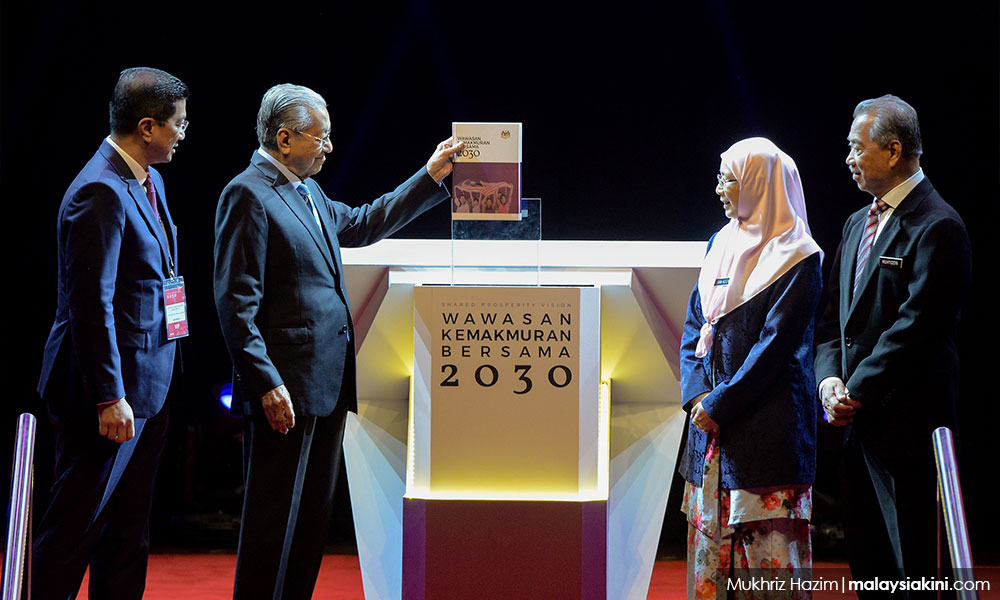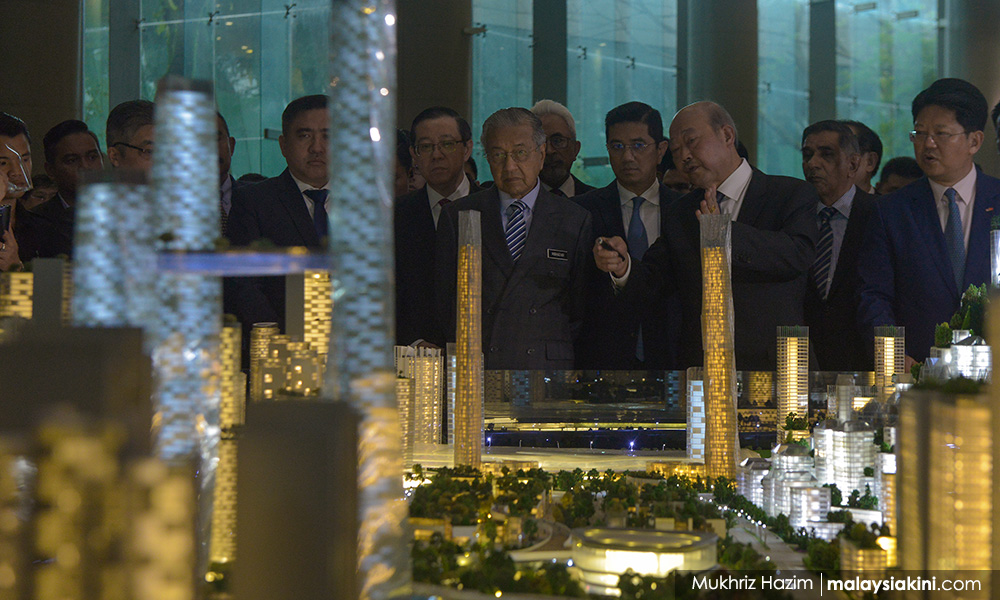MP SPEAKS | As Malaysia heads into the final year of Vision 2020, the government is confident the country’s economy will achieve a stronger and more sustainable growth of 4.8 percent next year.
This is due to Malaysia’s strong macroeconomic fundamentals, such as a highly-diversified economic and export structure, supportive labour market, low and stable inflation, a strong and well-capitalised financial sector and a healthy current account surplus of the balance of payments.
This outlook is higher than the estimates by the International Monetary Fund at 4.4 percent and the World Bank at 4.5 percent as the government remains committed to implementing its development priorities.
For 2020, RM56 billion has been allocated for 5,466 development projects to support the growth momentum and strengthen the country’s long-term economic capacity.
Of this amount, RM53.2 billion is allocated for 4,744 ongoing projects and the remaining amount of RM2.8 billion has been set aside for 722 new projects.
Over the next decade, the government will place greater emphasis on restructuring the economy by developing new economic areas to propel the economy forward and create business opportunities and high-paying jobs, in line with the objectives of Shared Prosperity Vision 2030 (Wawasan Kemakmuran Bersama 2030).
This entails ensuring an inclusive, sustainable and meaningful socio-economic development to provide a decent standard of living for all Malaysians, which will be operationalised through the Twelfth Malaysia Plan, 2021-2025 and the Thirteenth Malaysia Plan, 2026-2030.

The government remains vigilant and continues to focus on strengthening Malaysia’s near-term resilience and advancing structural reforms to raise medium-term growth.
Hence, the country’s growth potential will be optimised by strengthening productivity and innovation as catalysts of growth. Emphasis will be placed on empowering the manufacturing sector to produce more high quality, diverse and complex products.
In this regard, focus will be given to strengthening sectors with high growth potential such as aerospace, medical devices, E&E, machinery and equipment as well as chemicals and chemical products.
Similarly, the development and modernisation of the resource-based industries through research, development, commercialisation and innovation initiatives will also be given priority.
While the external environment continues to face uncertainties, the government will increase its efforts in building up resilience and boosting endogenous sources of growth as domestic demand will remain as the key driver of growth for 2020, underpinned by the continued expansion in private sector activity.
Also, household spending will continue to be supported by wage growth and favourable employment prospects.
This is in line with the Malaysia@Work initiative announced in Budget 2020 with a total allocation of RM6.5 billion for the next five years that is aimed at creating better employment opportunities for youth and women while reducing the country’s dependence on low-skilled foreign workers.
The upward revision of the minimum monthly wage rate to RM1,200 beginning Jan 1 in 57 cities and municipalities across Malaysia, along with cash transfer programmes, income tax refunds and lower cost of borrowings are also expected to provide additional impetus to household spending.
In ensuring economic development is not geographically centred, the government will boost economic activities at selected locations based on the strength and uniqueness of each area.
In this regard, 15 Key Economic Growth Areas have been identified as new sources of growth, comprising among others, Islamic Finance Hub 2.0; Commodity Malaysia 2.0; smart and high-value farming; content industry, animation and digitalisation; as well as manufacturing, supply and services related to the Fourth Industrial Revolution.
To improve regional balance, RM1.1 billion has been set aside in Budget 2020 to boost regional economic corridor development, among others in Chuping Valley Industrial Area in Perlis (RM50 million), Kuantan Port in Pahang (RM69.5 million), Sungai Segget Centralised Sewerage Treatment Plant in Johor (RM42 million), Samalaju Industrial Park in Sarawak (RM55 million) and Sabah Agro-Industrial Precinct (RM20 million).
Besides, private investment will be reinvigorated through more effective incentives, better coordinated promotional strategies and a more conducive business environment.
The government has made available up to RM1 billion worth of customised packaged investment incentives annually over the next five years as a strategic push to attract targeted Fortune 500 companies and global unicorns in high technology sectors.
To qualify, these companies must invest at least RM5 billion each in Malaysia which will generate additional economic activities, create 150,000 high-quality jobs over the next five years and strengthen our manufacturing and services ecosystems.
During the first nine months of this year, significant levels of foreign and domestic investments amounting to RM149 billion have been approved.

Recognising the importance of infrastructure projects to facilitate supply chains and the mobility of goods and people, several strategic projects will be continued into the Twelfth Malaysia Plan such as the Pan-Borneo Highway, East Coast Rail Link, Bandar Malaysia and Gemas-Johor Baru Electrified Double Tracking project.
Towards accelerating the digital economy and improving competitiveness, the government has lowered broadband prices by 49 percent and will implement the National Fiberisation and Connectivity Plan over the next five years.
Tax incentives will also be provided to further promote high value-added activities and increase productivity in transitioning into a 5G-enabled digital economy and Industry 4.0.
Furthermore, the government has also provided a comprehensive incentive package for SMEs to increase their contribution to the economy and facilitate access to financing.
The government will further allocate an additional RM50 million to My Co-Investment Fund (MyCIF) under the Securities Commission Malaysia to leverage such platforms to help finance underserved SMEs.
In addition, the government will provide a 50 percent matching grant of up to RM5,000 per company to adopt digitalisation for their business operation including the electronic Point of Sale systems (e-POS), Enterprise Resource Planning (ERP) and electronic payroll systems.
This matching grant will be worth RM500 million over five years, limited to the first 100,000 SMEs applying to upgrade their systems.
On the external front, Malaysia will continue to adopt an open trade and investment policy, particularly to pursue greater integration with Asean, leveraging on the region’s large population size of more than 600 million people.

The hosting of the Asia-Pacific Economic Cooperation (APEC) Summit and Visit Malaysia Year in 2020 will be catalysts for growth, particularly for the tourism industry.
In the context of an increasingly networked global economy, Malaysia will also continue to leverage our cultural endowment to further boost our competitive advantage.
In this regard, Malaysia has organised the Kuala Lumpur Summit (KL Summit), which saw the successful conclusion of 18 agreements, whereby leaders from across the Muslim world agreed to channel more direct investments toward the development of their economies.
Cooperations were forged during the KL Summit in areas of media, centres of excellence, youth exchange, defence and security as well as food security.
Among others, an agreement was concluded between Felcra Berhad and one of Qatar’s largest livestock and dairy farm owners, Baladna Food Industries, for a large-scale dairy venture to further strengthen the nation’s food security.
A document exchange involving aerospace components manufacturer Composites Technology Research Malaysia Sdn Bhd (CTRM) and Turkish Aerospace Industries (TAI) also took place on the sidelines of the KL Summit.
These initiatives undertaken by the government to build up resilience and boost endogenous sources of growth, along with better commodity prices and a stable ringgit, will pave the way towards enhancing Malaysia’s economic prospects.
Thus, the ongoing policy initiatives will further enhance Malaysia’s economic fundamentals and continue to support the ringgit going forward.
The government will continue to ensure that concerted efforts are undertaken to propel Malaysia towards achieving a more sustainable and equitable growth in line with the shared prosperity agenda.
AZMIN ALI is the economic affairs minister.
The views expressed here are those of the author/contributor and do not necessarily represent the views of Malaysiakini.

